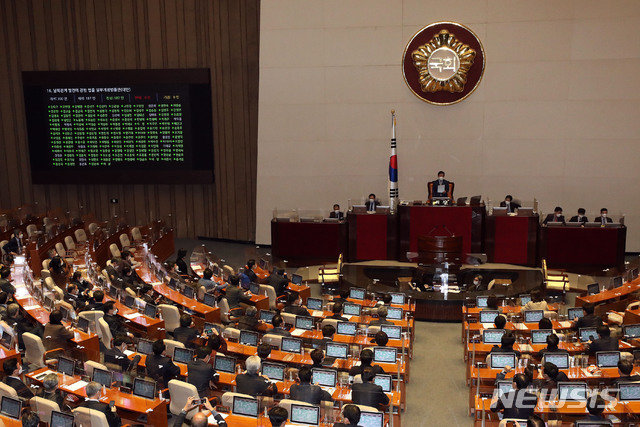?? ????????? ??? ??? ?? ??
“??? ?? ??? ?? ??… ?? ?? ?? ???? ?? ??”
“(?? 3?)??? ??? ???? ???? ??? ?? ??? ??”
??? ??? ??? ?? ?????????? ?????? ??? ??? ‘???? ?? ???’(??????? ???)? ?? “???? ??? ???(cornerstone)? ??? ??? ??? ??? ?? ???? ???? ?? ??? ???”? “??? ???(shortcomings)? ??”? ????.
??? ???? 16? ??? ?? ???? “(?? ????) ??? ?? ???? ???? ?? ????? ???? ?? ??? ??? ???? ???”? “?? ????? ?? ?? ? ???? ??(democratic institution)? ??? ??? ?? ??? ?? ????”? ???. ???? ??? ?? ?? ??? 3?? ?? ? ??? ??? ? ??? ??? ??? ???? ?? ?? ??? ??? ??? ? ???? ??? ???. ?? ??? ?? ????????? ???? ???? ?? ??? ??? ???? ??? ???? ?? ?? ??? ???? ??? ???? ????? ???? ???? ?? ??? ??? ??? ???? ??? ? ?? ??.
??? ???? “?? ???? 19?? ?? ??? ??? ??? ???? ??? ???? ??? ??”? “?? ???? ????? ?? ??? ??? ???? ????? ????? ?? ?? ??? ??? ??? ??? ??”? ??.
?????? ? ??? ???? ???????? ??? ???? ???? ????. ?? “??? ??? ?? ??? ???? ???? ??? ?? ????? ???? ??”? “??? (??? ?? ??? ??) ‘?????’ ‘??? ??’ ? ??? ??? ????. ?? ??? ??? ??? ??? ‘??? ??(margin of appreciation)’? ???? ?? ?? ?? ??? ???? ?”??? ???.
? “????? ?? ??? ??? ?? ?? ??? ??? ????? ??? ?? ??? ????? ???? ??? ??? ??”?? “??? ???? ????? ?? ??? ??? ??? ??? ??? ???? ???”?? ??.
??? ??? ???? ??? ?? ??(Statement) ??.
The amendment of the development of inter-Korean relations Act imposes strict limitations to many of the activities of defectors and civil society organizations that aim to engage with North Koreans in different areas of life. Most of these activities are protected by the freedom of expression recognized in article 19 of the Universal Declaration of Human Rights, in this case the right to impart and receive information and ideas regardless of frontiers that both people in the South and in the North are entitled to enjoy.
Under international human rights law, to which South Korea is obliged, restrictions on freedom of expression must be provided by law and justified by a concrete necessity, under strict determinations of motives and actions banned, and with proportional deterrence.
The amendment punishes the referred activities with imprisonment to up to 3 year, a provision which may compromise the principle of proportionality, since restrictive measures must be the least intrusive instrument, and this penalty of imprisonment seems to be excessive for actions which are based on the exercise of the freedom of expression, cornerstone for democratic society. The bill doesn‘t provide reasons to justify the use of this criminal punishment instead of sanctions from other branches of the law.
In addition, the amendment lacks preciseness required to identify actions banned when it uses general descriptions such as “propaganda materials, property profits”, or when it utilizes the term “etcetera”, which refers to a number of other unspecified actions (see article 4 subparagraphs 5 and 6). This indeterminate and blanket formula may challenge the compliance of the amendment with international human rights standards, according to which freedom of expression is not to be assessed by reference to a “margin of appreciation”.
Limitations to freedom of expression further require to justify a clear necessity, in particular by establishing a direct and immediate connection between the expression and the threat. In this regard, the necessity to prevent harm to the life or bodies of people or serious damages in border areas is a legitimate purpose. However, it has not been demonstrated a direct and immediate connection between all cross-border actions of civil society organizations and that kind of threat, other than the scattering of leaflets some years ago.
Moreover, the necessity to prevent harm to the life or bodies of people or serious damages does not apply to the prohibition of the say activities in third countries, a restriction also introduced in the legislation, where organizations from the civil society carry out multiple activities in neighboring areas of the third country to offer protection to North Koreans in both sides of the border, without compromising the rights of others as it has been argued in respect to residents along the Military Demarcation Line.
The bill also states that there is a necessity to restrict actions of defectors that impact on the other side of the border, because they threaten the Inter-Korean Agreement. In fact, compliance with the inter-Korean agreement, at least in some items, can be interpreted as the necessity to protect national security, one of the authorized grounds to impose restrictions on freedom of expression under international human rights law. Notwithstanding, the only actions of defectors organizations which are called for a stop in inter-Korean agreements are loud-speaker broadcasting and scattering of leaflets in the areas along the Military Demarcation Line (see section 2.1 of the Panmunjom Declaration for Peace, Prosperity and Unification of the Korean Peninsula). Under this reasoning, all other cross border civil society activities, including in third countries, protected by freedom of expression, shouldn’t be prohibited by the law or considered hostile acts without specific determination.
The amendment was provided by law, as required by international human rights standards, and subject to a democratic debate at the National Assembly of the Republic of Korea. Notwithstanding, in view of the shortcomings outlined above, the Special Rapporteur recommends that the amendment is duly review by the concerned democratic institutions before being enacted.
??? ?? aurinko@donga.com

·??? ?? record@donga.com



 ·??? ?? record@donga.com
·??? ?? record@donga.com 




